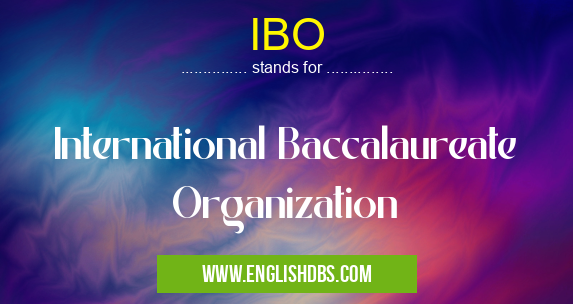What does IBO mean in SCHOOLS
The International Baccalaureate Organization (IBO) is an international educational organization, which focuses on providing a challenging and balanced curriculum for its students. The IBO was formed in 1968 and has more than 4,500 schools located in over 140 countries. Its mission is to develop inquiring, knowledgeable and caring young people who are able to help create a better and more peaceful world through intercultural understanding and respect. The IBO provides students with the skills, knowledge, and attitudes necessary to succeed in their post-secondary studies by offering world-recognized courses.

IBO meaning in Schools in Community
IBO mostly used in an acronym Schools in Category Community that means International Baccalaureate Organization
Shorthand: IBO,
Full Form: International Baccalaureate Organization
For more information of "International Baccalaureate Organization", see the section below.
What does IBO Stand for? IBO stands for International Baccalaureate Organization. It is an accredited international organization that works with schools throughout the world offering rigorous and comprehensive learning programs that are recognized worldwide and prepares children for success at the university level. IBO offers three educational programs
Primary Years Programme (ages 3-12), Middle Years Programme (ages 11-16), Diploma Programme (ages 16-19).
Essential Questions and Answers on International Baccalaureate Organization in "COMMUNITY»SCHOOLS"
What is the purpose of the International Baccalaureate Organization?
The International Baccalaureate (IB) Organization is an international education foundation that provides a rigorous program of educational development for students aged 3-19. The IB mission statement focuses on developing inquiring, knowledgeable and caring young people who are motivated to succeed. The organization also creates and implements high quality programs to promote international-mindedness among students from different cultures and backgrounds.
What types of programmes does IB offer?
IB offers four main programmes for students aged 3-19 - the Primary Years Programme (PYP), Middle Years Programme (MYP), Diploma Programme (DP) and Career-related Programme (CP). Each programme enables students to develop skills in critical thinking, research, inquiry, communication and collaboration. All programmes share a common set of core values which foster global citizenship values such as respect, tolerance, responsibility,Service amongst others.
Is the IB programme recognised worldwide?
Yes, the International Baccalaureate Organization is recognised by schools across the world. Over 5,000 schools have adopted one or more IB programmes to provide an international education experience for their students based on rigorous standards. As well as this, various universities across the globe recognise and grant credit for DP study plans that meet their course requirements.
How do I find an IB school near me?
To find a local IB school near you, please visit the official website of the International Baccalaureate Organisation at www.ibo.org and click on ‘Find An IB World School’ under ‘Schools’ tab. Here you can search by country/region/city to locate any authorised schools participating in any one or more of its four main programmes – Pyp (Primary Years Programme), MYP (Middle Years Programmes), DP (Diploma Programmes) and CP (Career-related Programmes).
Are there any costs associated with enrolling in an IB programme?
Participation in an IB programme at a school often requires payment of annual tuition fees which can vary depending upon location and type of institution offering ib courses. It should be noted however that some public schools may offer free bursary places or discounted tuition fees if available due to governmental funding initiatives benefiting specific socio-economic groups.
How do I register my child for an IB course?
You will need to contact your chosen school directly regarding admissions criteria as well as any other requirements that may be applicable prior to submitting your application form online or via post/email address provided by them along with all necessary documents such as birth certificate & immunisation record etc.
Is there an internal assessment process conducted by The International Baccalaureate Organisation?
Yes indeed - Internal Assessments are ongoing assessments conducted by teachers within classrooms using methods like essays, reports and presentations over several years before completing exams set by the organisation itself; depending on what particular ib programme your child enrols into – whether it be PYP(Primary Year's Program), MYP(Middle Year's Program), DP(Diploma Program) or CP(Career Related Programs).
Final Words:
The International Baccalaureate Organization (IBO) provides quality education globally through its standardized curriculums such as Primary Years Programme (ages 3-12), Middle Years Programme(ages 11-16) and Diploma Programme(ages 16-19). These programmes have been developed by experts of different backgrounds so that they can be properly adapted anywhere around the globe while still being internationally recognised; this way developing competent individuals capable of addressing global problems with cross cultural solutions enabling them to make meaningful contributions everywhere they go throughout life no matter their circumstances or background.
